6 Side Effects Of Using Sunscreen You Should Be Aware Of
Who knew the "messiah" of skin care has its own share of adverse effects?
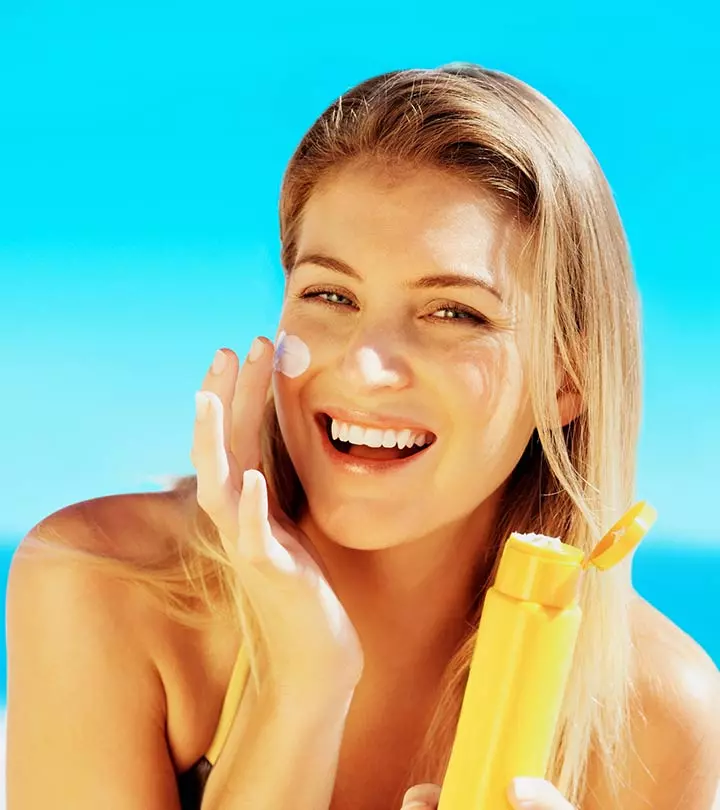
Image: Istock
Wearing sunscreen is a crucial step in the skin care routine. But are all sunscreens safe? Sunscreen side effects have been a cause for concern for a while now. Chemical sunscreens with tetracyclines, phenothiazines, and sulfa drugs may do more harm than good. Therefore, it is important to know what goes into your sunscreen and how it affects you. Read this article to know more. Scroll down.

How to Use Sunscreen:
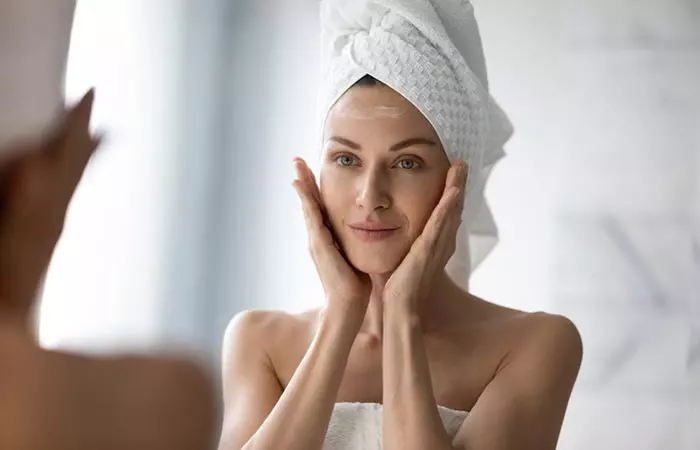
- Apply sunscreen all over the exposed skin.
- You must do this 30 minutes before going out in the sun.
- It is advised to re-apply with the sunscreen after swimming, sweating, etc.
- Even if you are indoors, keep re-applying sunscreen after every 4 hours.
In This Article
Side Effects of Sunscreen
Learning how to choose sunscreen is as crucial as understanding the side effect. Here are some of the common side effects of sunscreen:
1. Allergic Reactions

Sunscreens include some chemicals that can cause skin irritation such as redness, swelling, dryness, irritation, peeling of the skin, and itching. Some people develop severe allergic reactions with rashes and intense itching. This allergic reaction can be the result of chemicals found in sunscreens like fragrances and preservatives. PABAi An organic compound that is used to generate vitamin B9 (folic acid) and treat certain autoimmune diseases. is ideally used in many commercial sunscreens that can cause a high rate of allergic reactions. Hence, this is getting removed from many popular sunscreens of reputed brands(1), (2).
You can even buy sunscreens with the label ‘hypoallergenic’. Sunscreens that don’t contain PABA are often labeled, but some other chemicals can lead to an allergic problem (3). If you are not sure about the allergic reaction that may be caused by a sunscreen product, get a patch test done by a dermatologist. You can use sunscreens that contain zinc oxide, as they are less allergic.
2. Sunscreens Can Make Acne Worse
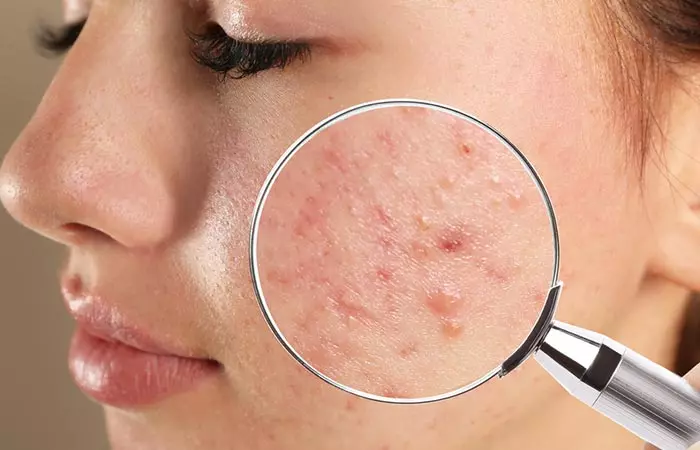
Do you have acne-prone skin or are you wondering, does sunscreen cause acne? Some chemicals in the sunscreen product can worsen your problem. To get rid of this side effect of sunscreen, you can choose non-comedogenici The property of a skin product that doesn’t clog your pores or lead to breakouts while allowing the skin to breathe. and non-oily sunscreens. It is suggested to use a sunscreen best suited for your skin type. Avoid using body sunscreens on the face, as these are too heavy (4).
 Quick Tip
Quick Tip3. Eye Irritation
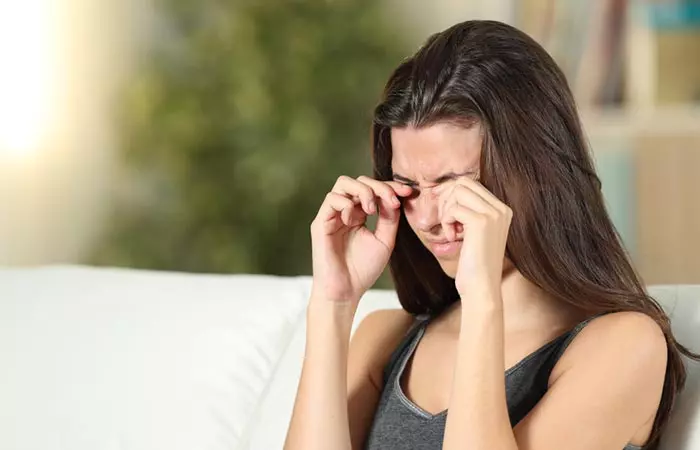
Getting sunscreen into the eye can cause pain and irritation. This can also lead to burning and temporary sensitivity to light. Some claim that chemical sunscreens can also cause blindness. If the sunscreen gets into the eyes, rinse them thoroughly with cool water or see your doctor (5).
 Quick Tip
Quick Tip4. Increases The Risk Of Breast Cancer
Sunscreen includes ingredients that can have estrogenic effectsi The effect of the hormone estrogen, which can act as a catalyst in the cancerous mutation of healthy cells and help them multiply and spread. on breast cancer cells. Some sunscreens can have effects on blood estrogens levels. Avoid using chemical sunscreens on your children, as their skin tends to absorb the chemicals instantly (6).
Benzophenone-3 is a common ingredient found in chemical sunscreens. It increases tumor cell proliferation and promotes breast cancer. A study conducted on mice showed that the use of BP-3 increased the proportion of epithelial tumors in mice that were fed an adult-restricted diet high in saturated animal fat (HFD).

Bp 3 Treatment Increased Tumor Proliferation
Source: Benzophenone 3 Promotion Of Mammary Tumorigenesis Is Diet-Dependent5. Pain in Hairy Areas
There are varieties of sunscreen that can be confusing to choose from. They are also available in many forms like gels, lotions, sprays, ointments, creams, and wax sticks. It is your personal choice to choose the type of sunscreen. Gels are best for hairy areas like the scalp or the male chest. Some sunscreens can lead to tightening or drying of the skin and can cause pain in hairy areas.
6. Pus in the Hair Follicles
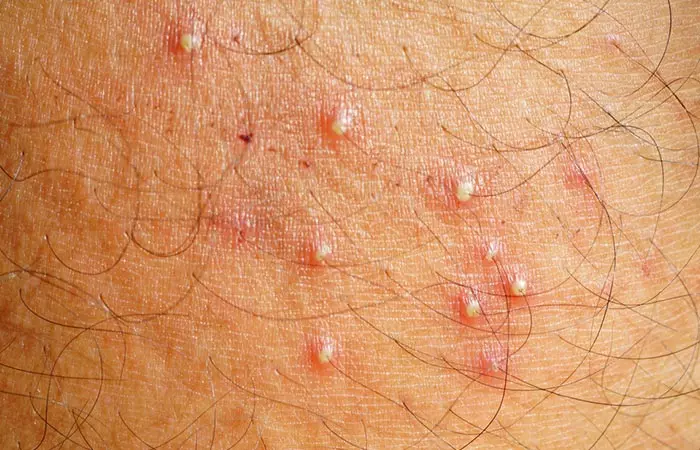
This is a rare side effect that occurs. However, it is not usually due to sunscreen. You need to consult a dermatologist immediately if you are experiencing any pain or discomfort.
Key Takeaways
- Use sunscreen about half an hour before exposing yourself to the sun, and then reapply it every four hours.
- Sunscreen use can result in skin irritation and allergy, acne, and clogged pores.
- Consult your doctor about switching to a different brand of sunscreen, if wearing it makes your skin red or irritated.
- Certain ingredients in chemical sunscreens have been linked to breast cancer and may even cause blindness, so be careful.
Tips To Avoid The Side Effects Caused By Sunscreen:
- Wash off and stop using the sunscreen if it causes redness or irritation.
- Talk to your doctor or seek the pharmacist’s advice about using a new sunscreen.
- Reapply sunscreen every 2 hours if you are outside for long periods.
- If you are using the lip balm form of sunscreen, apply it on the lip area only.
- Choose Sunscreen for your children very wisely.
- Avoid using sunscreen on kids younger than 6 months.
- Choose oil-free and non-comedogenic sunscreen if you have oily skin.
Since we have discussed tips to prevent sunscreen side effects, let’s address a hot question: Is Oxybenzone in sunscreens harmful or safe? Scroll down to read.
Is Oxybenzone In Sunscreen Safe?
Oxybenzone is a common ingredient in sunscreens that helps shield the skin from harmful UVA and UVB radiation linked to skin cancer (7). It absorbs these rays, transforms them into heat, and releases them from the skin, reducing the risk of DNA damage (8).
However, oxybenzone is somewhat controversial due to claims of being a “potential hormone disruptor” (9). It is said to interfere with the endocrine system that regulates various biological processes. Yet, the clinical significance of these concerns remains inconclusive.
While some studies suggest possible issues, most sunscreens are generally considered safe for human health. Still, if there are worries, mineral filters can be a good alternative. Consult a dermatologist to check if oxybenzone will suit your skin type.
Infographic: Possible Side Effects Of Using Sunscreen
Sunscreen is an essential part of your daily beauty routine that no one should ignore. Protecting your skin from UV damage is necessary. The question now is whether all of the sunscreens on the market are safe to use. Today, a lot of specialists discuss the potential adverse effects of sunscreen. Some of the compounds they contain can be much more harmful than beneficial.
To learn about the drawbacks of sunscreens, scroll down and read the infographic below.
Some thing wrong with infographic shortcode. please verify shortcode syntax
Sunscreen is an integral part of your skin care routine as it protects from harmful UV rays, sun damage, photosensitivity, and sunburn. However, not all sunscreens may be good for your skin. Some may cause serious side effects due to the ingredients used to make them. Sunscreens may cause allergic reactions, worsen acne, affect blood-estrogen levels, tighten your skin, and cause pus-filled blisters. You may have to follow the tips mentioned above to get rid of sunscreen’s side effects. It is always best to use chemical-free sunscreens to avoid allergic reactions. Always do a patch test before using any new product.
Frequently Asked Questions
How can I select the most suitable sunscreen for my skin type?
To choose the right sunscreen for your skin type, consider your skin’s sensitivity, oiliness, or dryness. Go for matte finish sunscreen if you have oily skin and choose dewy finish sunscreen if you have dry skin. Always go for broad-spectrum SPF, and consult a dermatologist for personalized recommendations if needed. Also, check the ingredients and opt for sunscreens that do not contain fragrance or any chemicals you might be allergic to, such as oxybenzone.
Are chemical sunscreens safe for kids?
Chemical sunscreens are generally considered safe for children over six months old. However, mineral sunscreens are suggested as a better alternative, and it is also advised to consult a pediatrician for personalized advice.
Does sunscreen make your skin darker?
Maybe. According to anecdotal evidence, certain ingredients such as zinc oxide or titanium dioxide may temporarily darken your skin.
Should I wear sunscreen at night?
Not needed. Anecdotal evidence suggests that sunscreen may dry your skin or clog your pores if left on overnight.
Can I skip moisturizer and use sunscreen?
No. Most sunscreens do not have hydrating properties. Hence, apply your moisturizer before your sunscreen.
Does water remove sunscreen?
This depends on the waterproof properties of sunscreen. However, it is recommended you reapply sunscreen every 2 hours.
Is it safe to use sunscreen on kids?
Yes, it is safe to use sunscreen on kids. Sunscreen can be safely used on children six months and older. Some sunscreens are labeled for babies or kids, but children can use the same sunscreen as adults.
Is SPF 30 or 50 better?
Both SPF 30 and SPF 50 sunscreens offer protection against UVB rays, which cause sunburn. However, SPF 50 provides slightly more protection than SPF 30, blocking 98% of UVB rays compared to SPF 30’s 96%.
Is SPF 50 good for black skin?
Yes, SPF 50 is good for black skin. Black skin has a higher concentration of melanin, which provides some natural protection against the sun but still requires additional protection.
Illustration: Side Effects Of Using Sunscreen You Should Be Aware Of
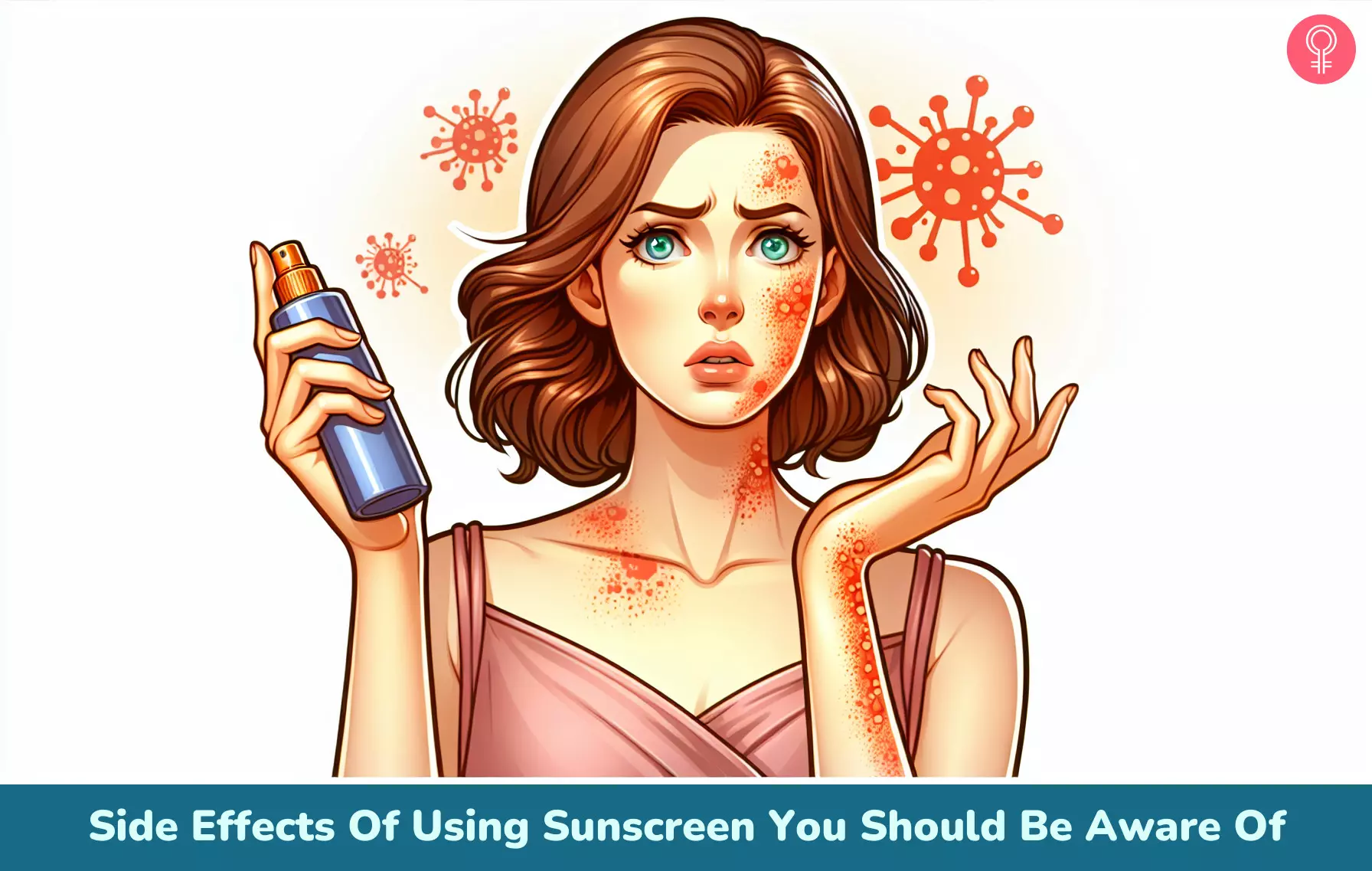
Image: Dall·E/StyleCraze Design Team
Learn about the effects of sunlight on your skin! Discover the benefits and harmful effects of sun exposure in this informative animation video.
References
Articles on StyleCraze are backed by verified information from peer-reviewed and academic research papers, reputed organizations, research institutions, and medical associations to ensure accuracy and relevance. Read our editorial policy to learn more.
- Sunscreen allergy and its investigation
https://www.sciencedirect.com/science/article/abs/pii/S0738081X10002105?via%3Dihub - Potential allergenicity of commonly sold high SPF broad spectrum sunscreens in the United States; from the perspective of patients with autoimmune skin disease
https://www.ncbi.nlm.nih.gov/pmc/articles/PMC6831754/ - Adverse Reactions to Sunscreens
https://karger.com/books/book/107/chapter-abstract/5048803/Adverse-Reactions-to-Sunscreens?redirectedFrom=fulltext - Efficacy Safety and Subject Satisfaction of a Specified Skin Care Regimen to Cleanse Medicate Moisturize and Protect the Skin of Patients Under Treatment for Acne Vulgaris
https://www.ncbi.nlm.nih.gov/pmc/articles/PMC4295855/ - Comprehensive Review of Ultraviolet Radiation and the Current Status on Sunscreens
https://www.ncbi.nlm.nih.gov/pmc/articles/PMC3460660/ - Benzophenone-3 promotion of mammary tumorigenesis is diet-dependent
https://www.ncbi.nlm.nih.gov/pmc/articles/PMC7721615/ - Skin cancer prevention
https://pubmed.ncbi.nlm.nih.gov/30137812/# - Update about the effects of the sunscreen ingredients oxybenzone and octinoxate on humans and the environment
https://pubmed.ncbi.nlm.nih.gov/31790045/ - The banned sunscreen ingredients and their impact on human health: a systematic review
https://www.ncbi.nlm.nih.gov/pmc/articles/PMC7648445/
Read full bio of Dr. Teo Wan Lin
Read full bio of Jyotsana Rao
Read full bio of Ramona Sinha
Read full bio of Swathi E







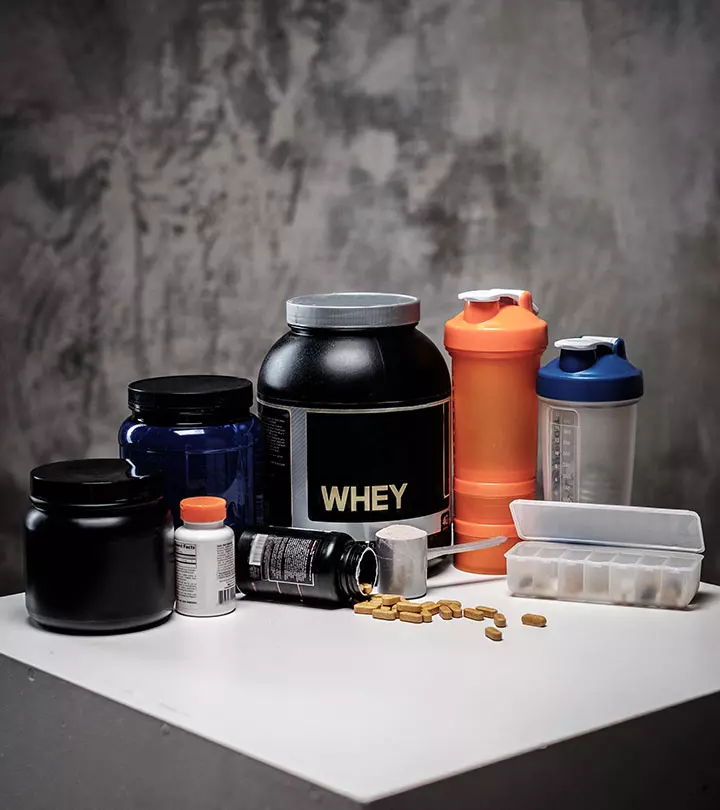

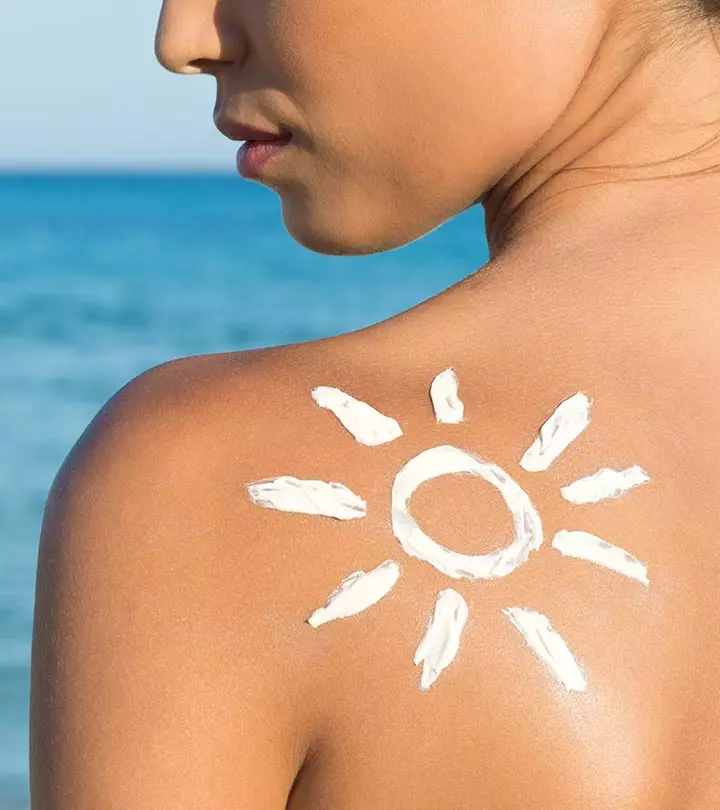
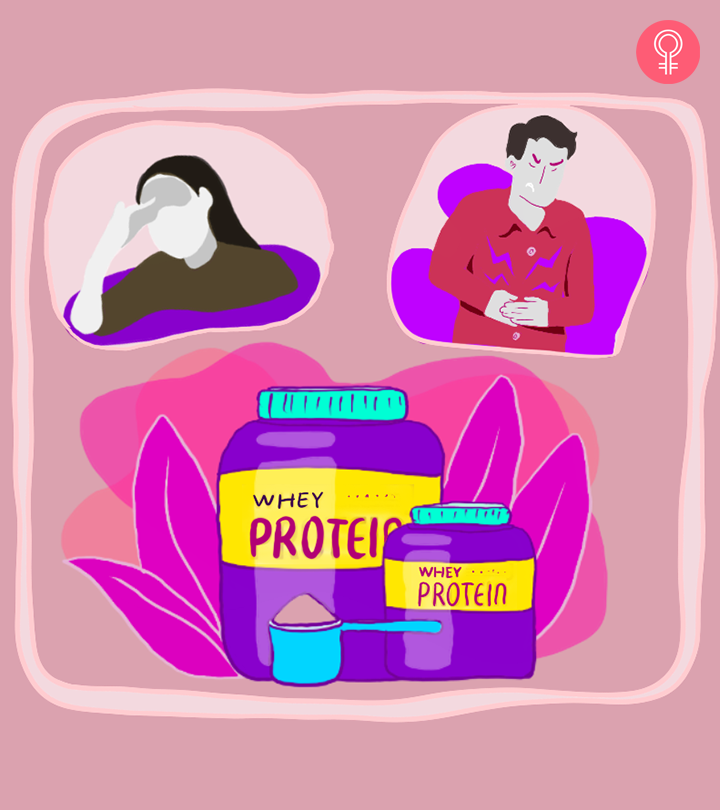

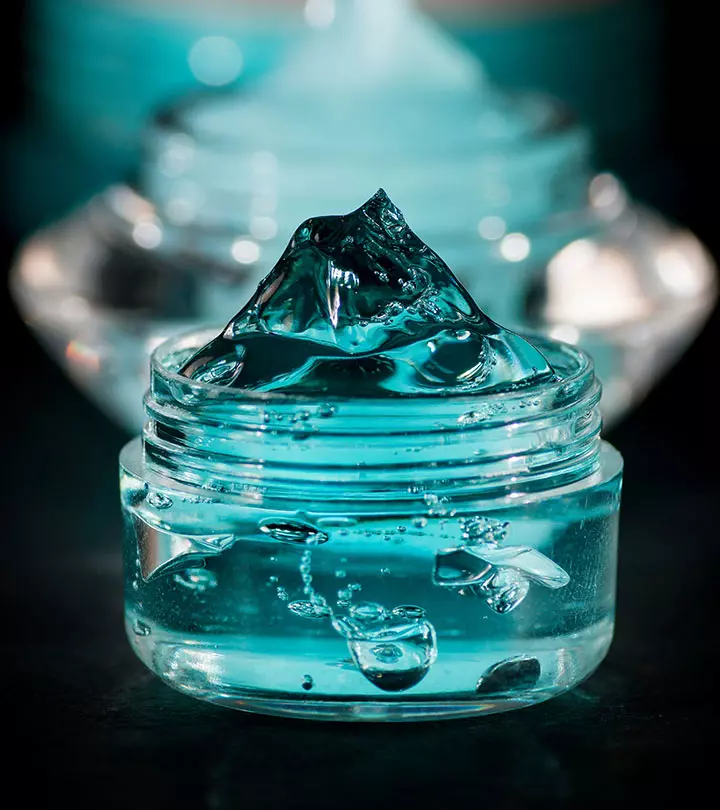

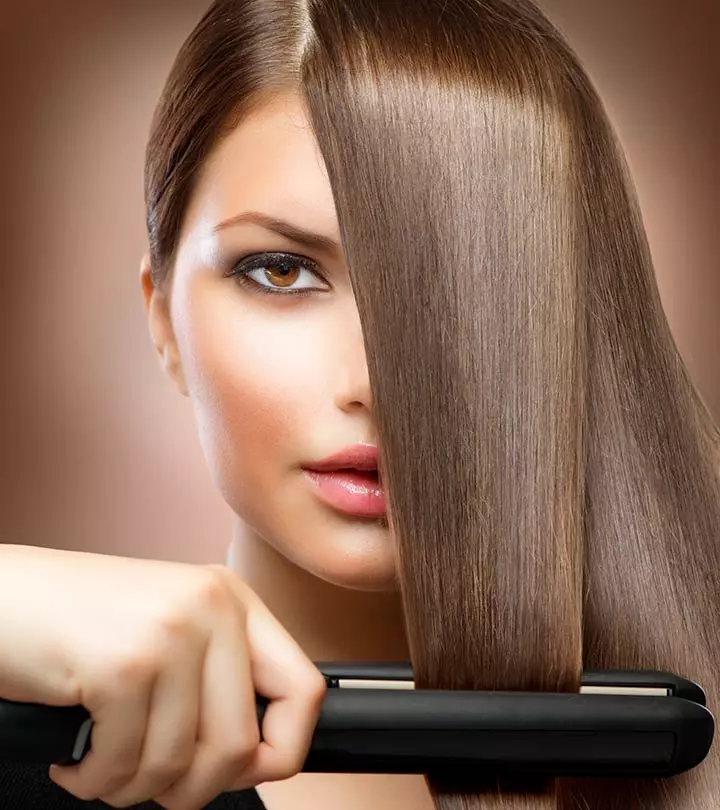

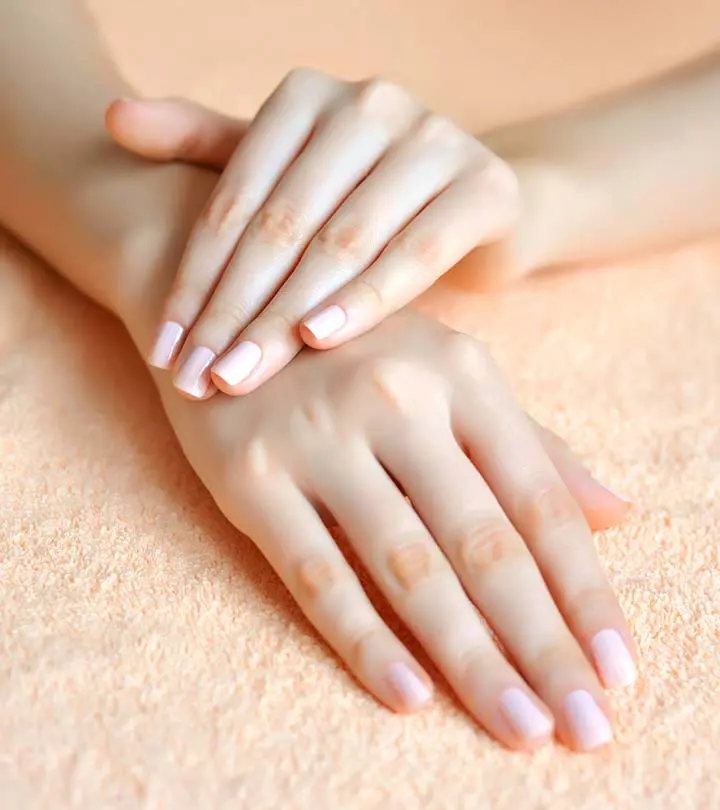
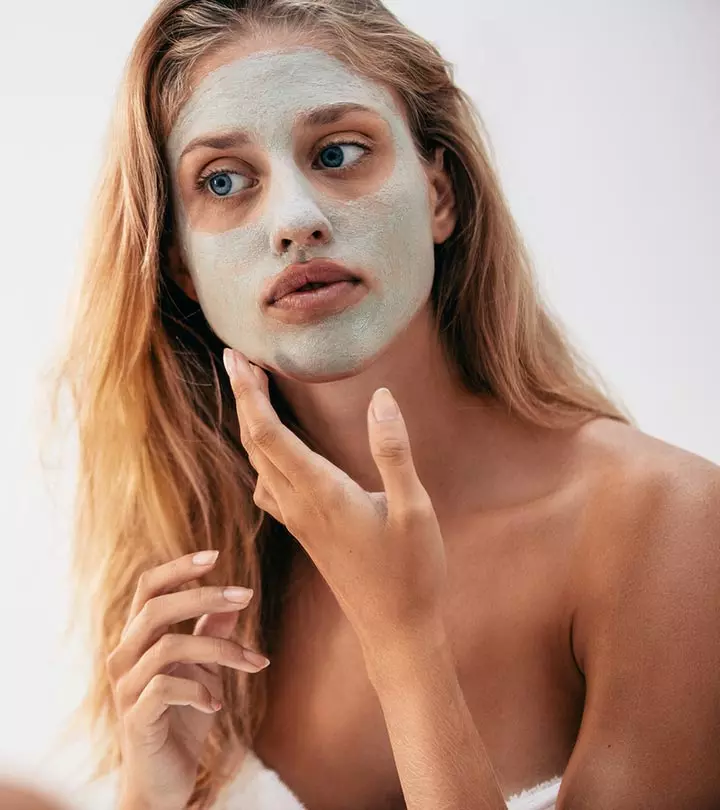

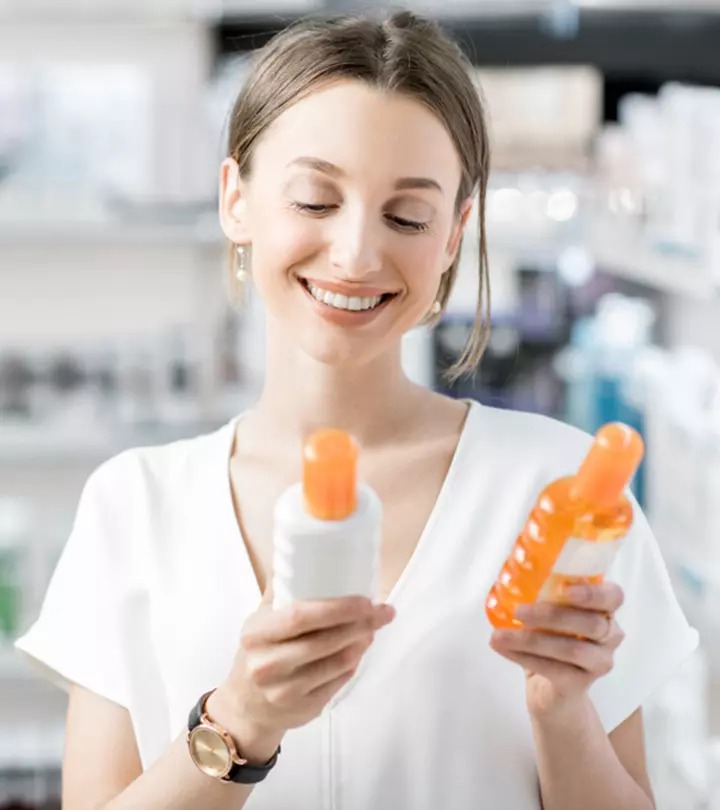
Community Experiences
Join the conversation and become a part of our empowering community! Share your stories, experiences, and insights to connect with other beauty, lifestyle, and health enthusiasts.